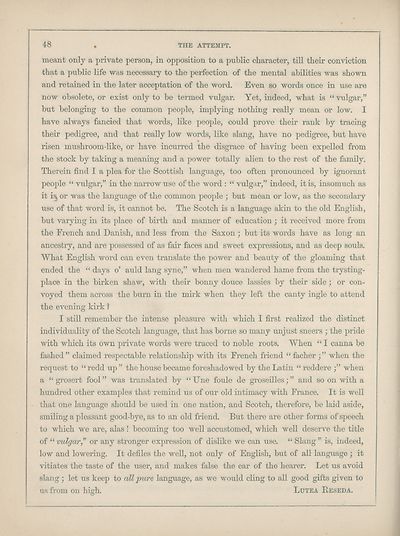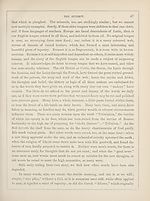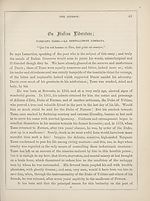Download files
Complete book:
Individual page:
Thumbnail gallery: Grid view | List view

48 . THE ATTEMPT.
meant only a private person, in opposition to a public character, till their con"VT.ction
that a public life was necessary to the perfection of the mental abilities was shown
and retained in the later acceptation of the word. Even so words once in use are
now obsolete, or exist only to be termed vulgar. Yet, indeed, what is " vulgar,"
but belonging to the common people, implying nothing really mean or low. I
have always fancied that words, like people, could prove theii" I'ank by tracing
their pedigree, and that really low words, like slang, have no pedigree, but have
risen mushroom-like, or have incurred the disgrace of having been expelled from
the stock by taking a meaning and a power totally alien to the rest of the fixmily.
Therein find I a plea for the Scottish language, too often pronounced by ignorant
people " vulgar," in the naiTOw use of the word : " vulg.ir," indeed, it is, insomuch as
it i^ or was the language of the common people ; but mean or low, as the secondary
use of that word is, it cannot be. The Scotch is a language akin to the old English,
but varying in its place of birth and manner of education ; it received more from
the French and Danish, and less from the Saxon ; but its words have as long an
ancestry, and are possessed of as fair faces and sweet expressions, and as deep souls.
What English woi-d can even translate the power and beauty of the gloaming that
ended the " days o' auld lang syne," when men wandered hame from the trysting-
place in the birken sliaw, with their bonny douce lassies by their side ; or con¬
voyed them across the burn in the mii'k when they left the canty ingle to attend
the evening kirk ?
I still remember the intense pleasure with which I first realized the distinct
individuality of the Scotch language, that has borne so many unjust sneers ; the pride
with which its own private words were traced to noble roots. When " I canna be
fashed " claimed i-espectable relationship with its French friend " facher ;" when the
request to " redd up " the house became foreshadowed by the Latin " reddere ;" when
a " grosert fool" was translated by " Une foule de groseOles;" and so on with a
hundred other examples that remind us of our old intimacy with France. It is well
that one language should be used in one nation, and Scotch, therefore, be laid aside,
smiling a pleasant good-bye, as to an old friend. But there are other forms of speech
to which we are, alas! becoming too well accustomed, which well deserve the title
of " vulgar," or any stronger exjiression of dislike we can use. " Slang " is, indeed,
low and lowering. It defiles the well, not only of English, but of all language; it
vitiates the taste of the user, and makes false the ear of the hearer. Let us avoid
slang ; let us keep to all pure language, as we would cling to all good gifts given to
us from on high. Lutea Reseda.
meant only a private person, in opposition to a public character, till their con"VT.ction
that a public life was necessary to the perfection of the mental abilities was shown
and retained in the later acceptation of the word. Even so words once in use are
now obsolete, or exist only to be termed vulgar. Yet, indeed, what is " vulgar,"
but belonging to the common people, implying nothing really mean or low. I
have always fancied that words, like people, could prove theii" I'ank by tracing
their pedigree, and that really low words, like slang, have no pedigree, but have
risen mushroom-like, or have incurred the disgrace of having been expelled from
the stock by taking a meaning and a power totally alien to the rest of the fixmily.
Therein find I a plea for the Scottish language, too often pronounced by ignorant
people " vulgar," in the naiTOw use of the word : " vulg.ir," indeed, it is, insomuch as
it i^ or was the language of the common people ; but mean or low, as the secondary
use of that word is, it cannot be. The Scotch is a language akin to the old English,
but varying in its place of birth and manner of education ; it received more from
the French and Danish, and less from the Saxon ; but its words have as long an
ancestry, and are possessed of as fair faces and sweet expressions, and as deep souls.
What English woi-d can even translate the power and beauty of the gloaming that
ended the " days o' auld lang syne," when men wandered hame from the trysting-
place in the birken sliaw, with their bonny douce lassies by their side ; or con¬
voyed them across the burn in the mii'k when they left the canty ingle to attend
the evening kirk ?
I still remember the intense pleasure with which I first realized the distinct
individuality of the Scotch language, that has borne so many unjust sneers ; the pride
with which its own private words were traced to noble roots. When " I canna be
fashed " claimed i-espectable relationship with its French friend " facher ;" when the
request to " redd up " the house became foreshadowed by the Latin " reddere ;" when
a " grosert fool" was translated by " Une foule de groseOles;" and so on with a
hundred other examples that remind us of our old intimacy with France. It is well
that one language should be used in one nation, and Scotch, therefore, be laid aside,
smiling a pleasant good-bye, as to an old friend. But there are other forms of speech
to which we are, alas! becoming too well accustomed, which well deserve the title
of " vulgar," or any stronger exjiression of dislike we can use. " Slang " is, indeed,
low and lowering. It defiles the well, not only of English, but of all language; it
vitiates the taste of the user, and makes false the ear of the hearer. Let us avoid
slang ; let us keep to all pure language, as we would cling to all good gifts given to
us from on high. Lutea Reseda.
Set display mode to: Large image | Transcription
Images and transcriptions on this page, including medium image downloads, may be used under the Creative Commons Attribution 4.0 International Licence unless otherwise stated. ![]()
| Ladies' Edinburgh Debating Society publications > Attempt > Volume 3 > (62) Page 48 |
|---|
| Permanent URL | https://digital.nls.uk/104343976 |
|---|
| Attribution and copyright: |
|
|---|

